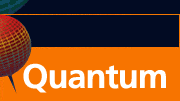CONTACTS
- Coordinator
Yigit Subasi
-
Quantum Lunch Location:
T-Division Conference Room, TA-3,
Building 123, Room 121
 |


Quantum Institute: Visitor Schedule
The Quantum Lunch is regularly held on Thursdays in the Theoretical Division Conference Room, TA-3, Building 123, Room 121.
The organizing committee includes Malcolm Boshier (P-21), Lukasz Cincio (T-4), Diego Dalvit (T-4), Michael Di Rosa (C-PCS), Changhyun Ryu (P-21) , Nikolai Sinitsyn (T-4), Rolando Somma (T-4), Yigit Subasi (T-4), Christopher Ticknor (T-1), and Wojciech Zurek (T-4).
For more information, or to nominate a speaker, contact Yigit Subasi.
To add your name to the Quantum Lunch email list, contact Kacy Hopwood.
Thursday December 8, 2016
12:30 PM - 2:00 PM
Speaker: Lorenzo Campos Venuti (USC)
Technical Host: Rolando Somma
TOPIC: To protect and to increase quantum coherence
Abstract
I will discuss two questions related to quantum coherence. The first question is whether it is possible to perform quantum information processing in presence of strong dissipation. I will consider a strongly dissipative system admitting a non-trivial manifold of steady states. I will show how one can enact quantum logical gates inside this steady-state manifold by adding a weak, time-rescaled, Hamiltonian term into the system's Liouvillian. The effective dynamics is governed by a projected Hamiltonian which results from the interplay between the weak unitary control and the fast relaxation process. The leakage outside the steady-state manifold entailed by the Hamiltonian term is suppressed by an environment-induced symmetrization of the dynamics. Given sufficient resources this approach allows for universal quantum computation and even completely dissipative-generated quantum gates. In the second part I will discuss adiabatic quantum computation in presence of noise and in particular examine whether a speedup can survive at finite temperature. I will introduce a framework where the adiabatic preparation time can naturally be compared to the relaxation time of a classical Markov chain. Using known bounds for the mixing time and for the open-system adiabatic theorem, one is led to a rather astonishing paradox. Namely relaxation seems always faster than adiabatic preparation. In systems describing thermalization I resolve the paradox by estimating an adiabatic bound in the low temperature limit. In this seeting, systems admitting a speedup at zero-temperature will still show a speedup for sufficiently low temperature.
|


